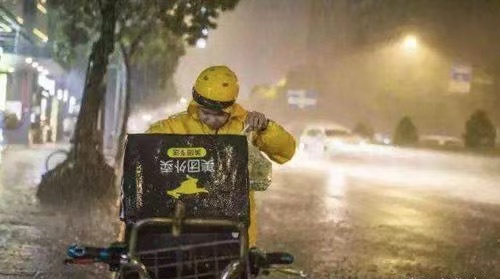Why Are Young People Flooding the Waimai Industry?
Step foot into any restaurant in Beijing, and you'll instantly spot a food delivery guy – 外卖小哥 wàimài xiǎogē in Chinese, lit.: little delivery brother – in their telltale yellow or blue outfits, waiting for restaurants to prep the orders.

Data from Meituan, one of China's top food delivery apps, shows that in 2021, Beijing ranked in the top three cities with the most active waimai economy, accounting for about one million orders placed daily and some 80,000 delivery drivers operating in the city.
The data also reveals the demand for online delivery personnel is expected to reach 30 million over the next five years in China. This means that ever more people will flood the industry. But the large number of people flocking to the waimai industry has caused major job shortages for manufacturing industries that are struggling to hire people.

Delivering waimai is certainly no easy task and drivers often face harsh weather conditions. Last April, Meituan's deputy director of human resources experienced firsthand what it felt like to work as a delivery driver for one day in Beijing. He only earned about RMB 41 during a 12-hour shift, and grew so exhausted that he collapsed on the curb and said: “It is too damn hard to be a delivery guy!”

But despite such challenging work, it seems like many young people prefer delivering waimai to working at a factory, which has many wondering: Why are people choosing this profession?
To answer this, I spoke with a Beijinger who used to work in a factory but recently shifted to waimai. He told me that working at a factory is much harder than delivering food. “The amount of workload at a factory can be pretty intense, and you have to constantly work for about 10 hours a day. Plus, a lot of times you have to be on night shifts, which can burn you out," he explains.
Another key factor that most delivery drivers value is freedom. “Even though this job can expose you to harsh weather conditions, compared to a traditional factory setting, there is a lot more freedom and I get to pick when to make deliveries on my own,” another deliveryman working for Eleme told me.

Moreover, for most of these employees, the waimai industry can be highly rewarding as long as they are willing to work more. According to Meituan, in a city like Beijing, depending on how many orders you can deliver in one day, 45.7 percent of riders can make between RMB 8,000 and RMB 10,000 per month, while 37.1 percent can earn between RMB 10,000 and RMB 15,000 monthly.

What’s worth mentioning is nearly half of all waimai drivers were born in the '90s, and among them, 24.7 percent hold an associate's degree or above. The fact that a large number of college students are turning to the delivery industry has sparked a heated debate on the internet.
Many netizens say that it is a total waste of money for parents to send their kids to college if they end up delivering waimai. But others disagree, saying people shouldn’t judge different careers and every trade has its own master.

“There isn’t much freedom at factories and the salaries aren't high” one netizen commented. “If factories can let workers take two days off in a week and provide paid holidays and a higher salary, then there will be more people rushing into factories without any doubt," another wrote.
The phenomenon has even been a hot topic at the annual meeting of China's top legislature, with one National People's Congress delegate and chairman of a Chongqing automaking company, proposing subsidies for factories to help them compete with tech and delivery companies.
What do you think of the fact that many college grads are flooding the waimai industry? Let us know in the comments!
Read: The Crazy World of Livestreaming in China
Images: 电商报,舒莫财经,微博







